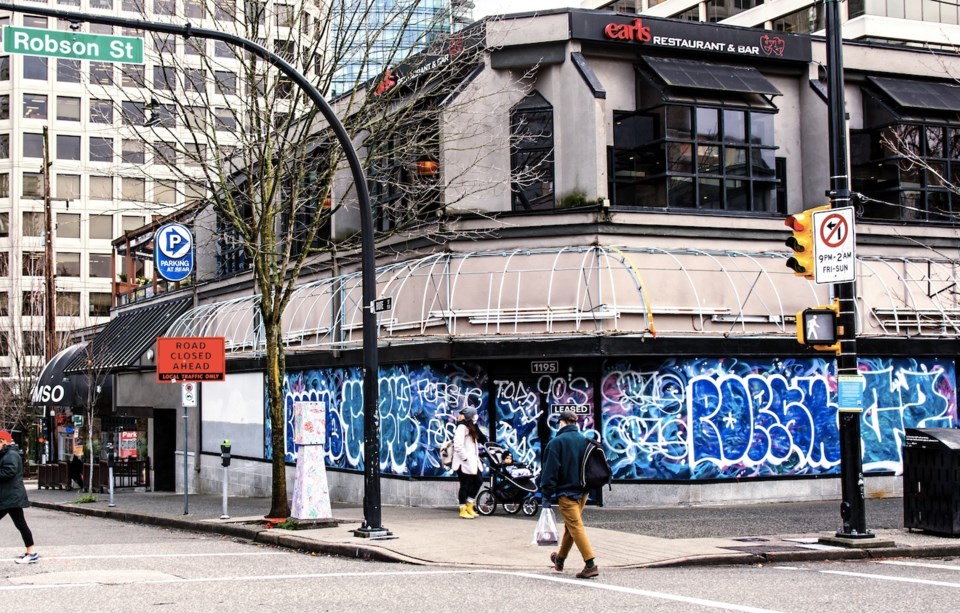The pandemic has ravaged many businesses. But hey, why stop there?
Vancouver council has a mind to go further.
No joke: It has asked the province to explore granting it permission to tax . . .
Wait for it . . .
Empty stores.
Just when you thought you could never cure the local merchant misery, along comes the prescription: when a business fails and leaves the landowner to carry the mortgage, or when a property is bought and not suitably and swiftly occupied, Vancouver would impose a tax if the place remained vacant.
Thus the mayor and six councillors (two opposed, two were absent for the vote) are asking the like-minded NDP provincial government to examine the concept with an aim to grant municipal tax privileges under the Vancouver Charter.
Mayor Kennedy Stewart, bearing absolutely no evidence to support his theory, suggests there are “speculators” out there who buy commercial properties, leave them empty, “and wait for them to deteriorate” as the land value increases so, the theory goes, they may be sold at a great profit and gutted. In a city where you have to be an idiot to lose money on real estate, his scheme requires a certain genius to make some.
The devils in the details – how long the vacancy would endure before the tax comes, how high it would be – are still sketchy, in keeping with business ideas emanating from city hall. But it is to wonder which landowner working in authority at Cambie and 12th might have thought this an inspired incentive.
To date, no one has been found.
For a half-dozen years, the city’s Empty Homes Tax has been (besides a brazen tax grab, rising to five per cent of assessed value next year) a pointed stick applied to owners to rent their vacant properties in a residential market of minuscule vacancy.
There is no such problem with commercial property – indeed, there seems an unhealthy glut, thanks to that pesky pandemic among other things – yet the mayor asserts there are landlords in love with their stilled storefronts and enamoured even more with the solitary heroics of bearing a costly mortgage with no revenue against it.
To date, there too, no one has been found.
That pesky pandemic spurred more online shopping, less foot traffic, supply chain problems and a deepening of labour shortages, layering the challenges of successfully running a store in the city. This calls for help, not another heap of taxation. The empty-headed Empty Stores gambit is, in fact, a cruel prank that will not tempt new landlord-tenant leases to emerge from the woodwork or coax vivacious commerce on a deadened street.
If storefronts are empty, it is more likely due to the city’s other version of the Empty Stores Tax: the existing commercial tax rates, four times those of residential ones, with the imposition of that tax, and thus on the rents, on the “highest and best use” feasible of a building. It bears noting that eventually the consumer pays for this civic havoc.
A new tax would kick owners while they’re down with one hand tied behind their backs in a city of world-class expense that has no plan to deal with a rise in casual vandalism and consequence-free break-ins. Urban British Columbia mayors last week wrote the province begging for tougher treatment of repeat property crime offenders. In Vancouver, there are 40 “super-chronic” offenders with an average of 54 convictions amid a soaring growth in cases prosecutors bring to the courts in the revolving-door dance of crime, conviction, sentence and parole.
The point of owning a storefront is not to shutter it but to rent it, providing of course that city hall’s permitting crew will on occasion emerge from its induced coma so as not to impede planned improvements.
Taxes hardly ever solve problems and hardly ever fail to create some. They certainly don’t stimulate markets. But as the election campaign starts in earnest, the mayor is ticking the box on down-the-road initiatives to gather right-now support among the many voters with no skin in the game, whether as non-owners of commercial or residential property. These politics of division and class conflict are in his playbook as a pretense of social and economic justice. The mayor’s insistence that the tax wouldn’t apply to “good” landlords is the perfect dog whistle of this context.
Indeed, successive regimes have found it easy to stoke voter animus to homeowners perceived to be of ill-gotten riches who resist a suddenly densified district – or, with this latest version, landlords who hoard bereft buildings and sit on an incessantly enlarging pot of gold.
These are convenient villains for the saviour on the white horse at election time, and this and previous administrations have done well to convince enough people that a reckoning is theirs to claim, that the city can make housing affordable, deal a discernible impact on climate change, end systemic discrimination, make the streets safer with fewer police and earmark homelessness as a thing of the past.
Who wouldn’t want a city that aspires to and achieves all that? But look, to do it, we need some new taxes. How about an Empty Nest Tax when children move out to college, or an Empty Net Tax when I’m pulled as a beer league goalie for an extra attacker late in the game?
No? Fear not. To quote the late and great Jimmy Durante, I got a million of them. •
Kirk LaPointe is publisher and editor-in-chief of BIV and vice-president, editorial, of Glacier Media.


